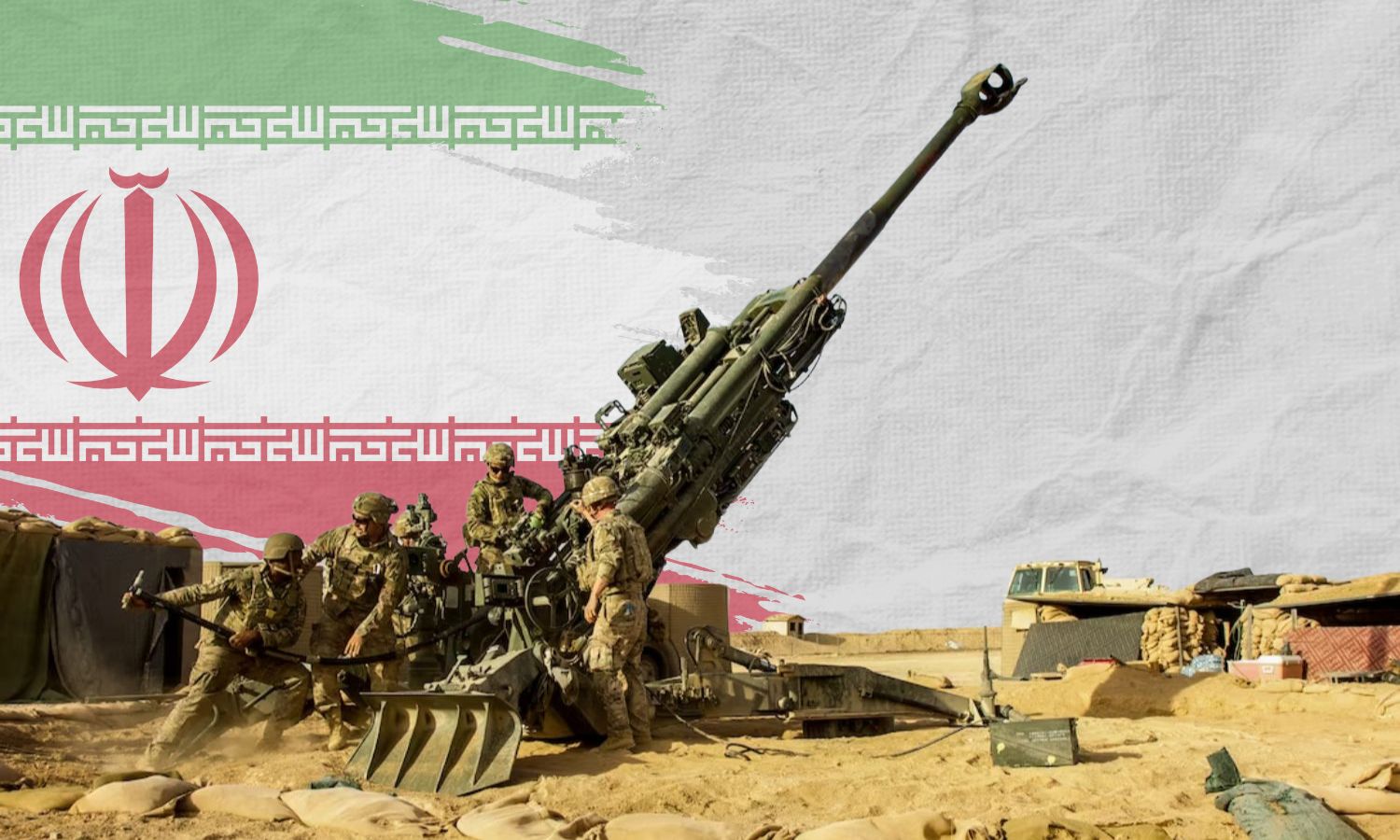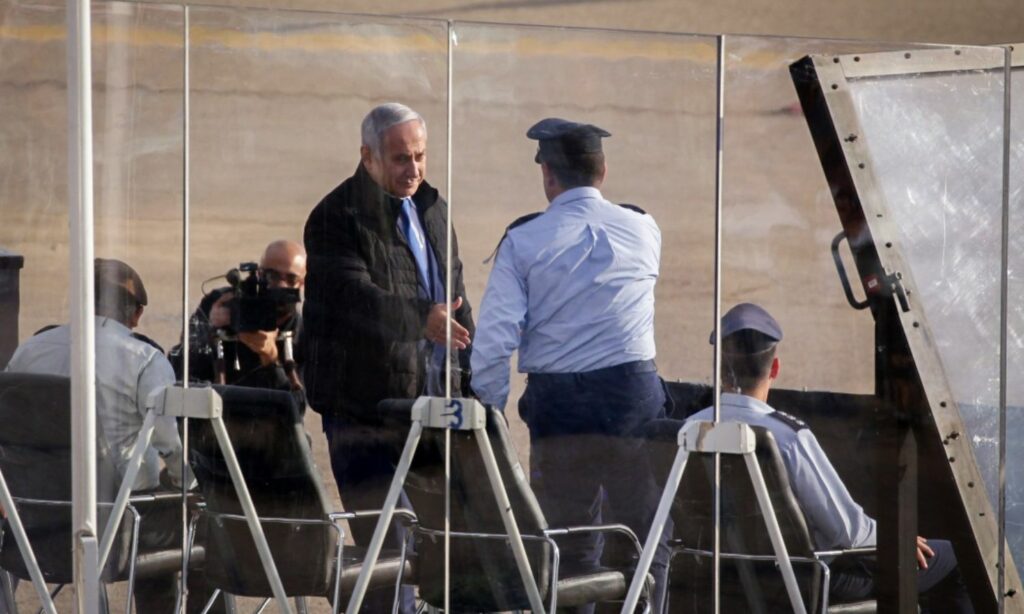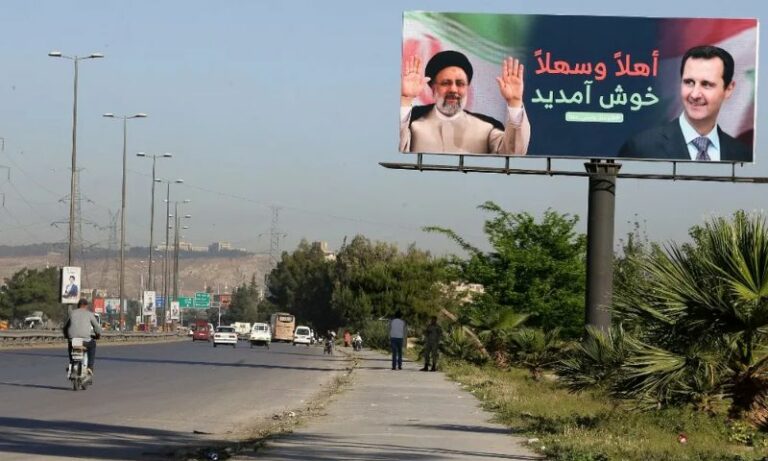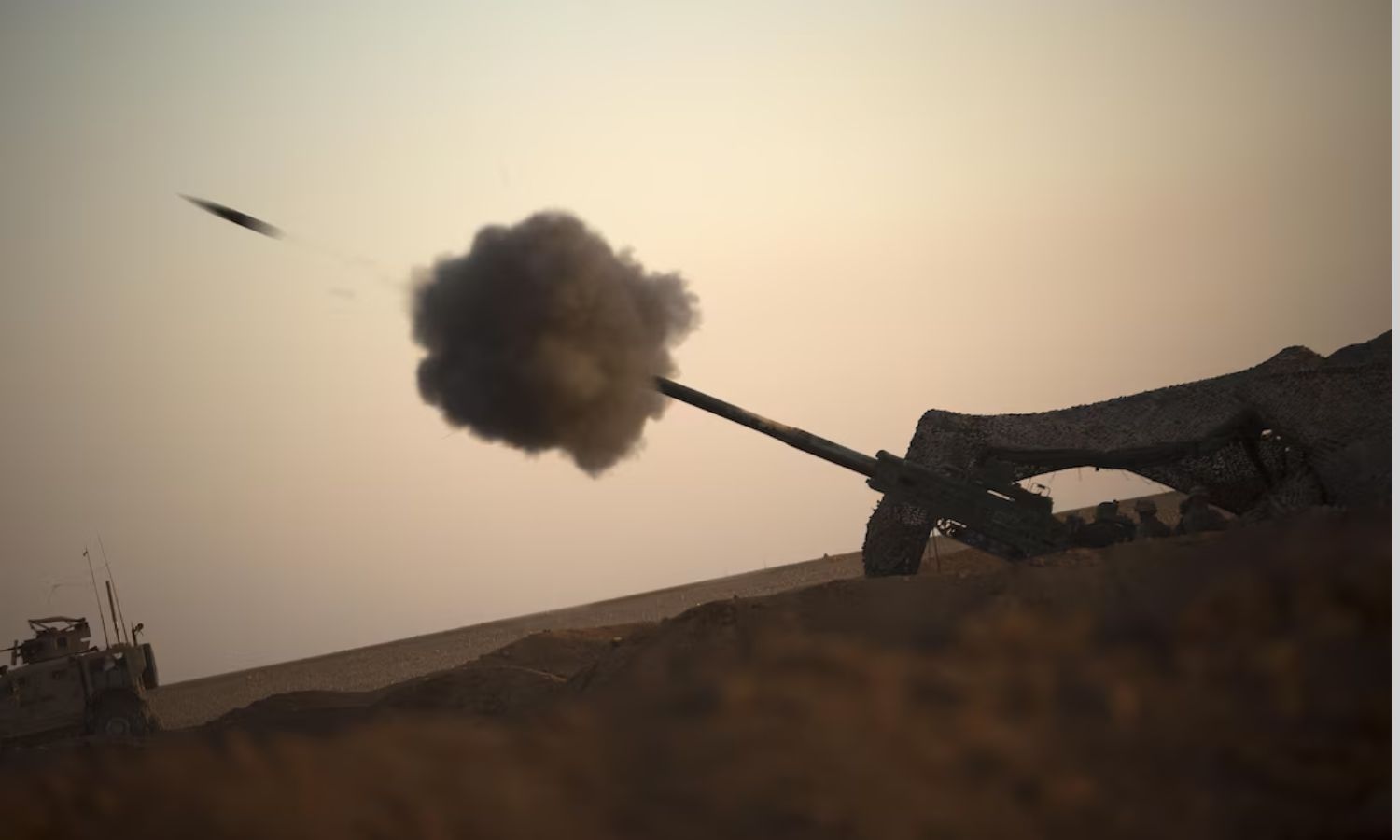



Enab Baladi – Khaled al-Jeratli
The US-Iranian escalation has taken a new turn when Washington announced strikes on command and control centers, intelligence facilities, and weapon storage facilities used by Iran-backed militias to attack American forces and the International Coalition.
Through a series of attacks, the United States targeted 85 locations in Syria and Iraq, in response to the killing of its soldiers by shelling for which Iran was accused of being involved.
The US raids did not seem to have a significant impact on undermining the ability of Iran-backed militias to carry out operations against them in the two neighboring countries, as a series of raids were followed by missile attacks and others with drones, targeting military bases where American forces are stationed in eastern Syria and northern Iraq.
Meanwhile, it cannot be asserted the impact of these raids, as the operations of the Iran-backed militias continued, but the United States said for its part that it has not ended its retaliatory operation for the killing of its soldiers in Syria.
White House National Security Advisor Jake Sullivan said in an interview with NBC NEWS on Sunday evening, February 4, that the United States will carry out more military attacks against Iran-backed groups, considering that the attacks they launched last weekend “are not final.”
On the evening of Monday, February 5, the United Nations Security Council met urgently at the request of Russia to consider the American retaliatory attacks in Syria and Iraq, at which time a Russian-American discussion was recorded about the legitimacy of these strikes.
Rosemary DiCarlo, UN Under-Secretary-General for Political Affairs and Peacebuilding, opened the meeting by calling on the parties to the conflict in the Middle East to “back away from the brink of the abyss.”
Researchers, in a comprehensive report prepared by Enab Baladi previously, concluded that the Iranian strategy in itself is a form of “brinkmanship policy” that can lead to accidental and unplanned conflicts, making it a high-stakes game for all participants involved.
The adopted Iranian strategy is accompanied by an official denial of any responsibility for targeting American interests or bases in the Middle East, and the Iranian ambassador and permanent representative to the United Nations, Amir Saeed Iravani, had said that his country never participated in any act or attack against US forces in Syria and Iraq.
Iravani’s statement came in response to a letter written by the United States to the Security Council, accusing Iran of acting against its forces in Syria and Iraq, according to what was reported by the Iranian Mehr agency at the time.
Iravani sent a message to the UN Secretary-General, António Guterres, stating that the United States is trying to “legitimize its illegal military actions in Syria,” and that the claims that Iran is involved in attacks on American bases in Syria and Iraq have no basis in truth and are aimed at “justifying the United States’ continuous violation of international laws and UN Charter in Syria.”
Iranian Foreign Minister, Hossein Amir Abdollahian, also denied that Tehran was responsible for these attacks.
With the escalation of targeting US bases in the region, Pentagon Press Secretary, Pat Ryder, accused Iranian proxies of exploiting the ongoing “war” in Gaza to push the United States towards withdrawing from Syria and Iraq.
In a recorded press conference published by the Pentagon on November 27, 2023, Ryder added that Iranian agents are trying to benefit from the war in Gaza to achieve their own goals.
In the case of Iraq and Syria, these groups have long aspired to see US forces leave, according to Ryder, noting that the presence of his country’s forces in Iraq came at the invitation of the Iraqi government and focuses only on defeating the Islamic State organization, without referring to the justifications for their deployment in Syria.
Ryder considered that the ongoing war in Palestine has been contained, but Iranian agents continue to try to exploit the situation.
Aron Lund, a researcher on Syrian affairs at the Century International center, told Enab Baladi that it is certain that both sides want the other out of Syria, but after the “Al-Quds Flood” operation launched by the Islamic Resistance Movement (Hamas) against Israel, other issues have come to the fore.
He added that Iran and its allies, including the Syrian regime and the Iranian-backed Shiite militias in Iraq, are trying to pressure the United States in order to force it to rein in Israel in Gaza, as the current escalation is not primarily about ousting the United States from Syria, although that could, theoretically, be the outcome.
Research fellow at Century International Foundation for International Research and Policy, specialized in Syrian affairs, Sam Heller, believes it is not clear how serious Iran is about working to push the United States to withdraw from Syria.
He added that Iran is obviously keen to avoid direct conflict with the United States, noting that the current situation may be the best opportunity for Iran and its allies to get the United States out from Iraq and Syria, through the “strategic dialogue” that recently began between Baghdad and Washington.
Heller sees that if US forces leave Iraq, then the US presence in Syria – which depends on the Iraq presence for logistics – would likely become untenable.

A drone launched by the Islamic Resistance in Iraq towards a target inside Israel – January 28, 2024 (Islamic Resistance in Iraq)
The Iranian deployment in Syria has been on Israel’s priority list, the closest ally of the United States in the region, over the past years, as Tel Aviv has repeatedly attacked Iranian interests in Syria, the latest of which were strikes that killed “advisors” in the “Iranian Revolutionary Guard” in the Syrian capital Damascus.
The Israeli targeting of “Iranian advisors” was revealed on January 20, when Israel killed five members of the “Iranian Islamic Revolutionary Guard Corps (IRGC)” in Syria, as announced by Iran.
Later it became clear that one of the deceased was nicknamed “Haj Sadiq,” who had been mentioned in a report published by The Washington Post in June 2023, as being tasked with increasing attacks against US bases in Syria.
One of the documents discussed by the newspaper stated that Haj Sadiq specifically identified American vehicles like “Humvees” and “Cougars” as targets, noting that he sent individuals to scout and take some pictures of the routes used by US forces in Syria.
The Washington Post report noted that Iran’s strategy managed by Haj Sadiq is based on building and training forces to use armor-piercing bombs, specifically planted on roads to target US military vehicles and kill US personnel.
Expert on Iranian affairs, Marwan Farzat, told Enab Baladi that neither Israel nor the United States are interested in the Iranian presence in Syria in general, and that their activity is limited to fighting Iran’s influence over the southern regions of Syria primarily.
The repeated Israeli strikes on Iranian interests aim to reduce the flow of weapons to the Lebanese Hezbollah and to undermine Iranian influence only in southern Syria, adjacent to the occupied Syrian Golan Heights, according to Farzat.
On the other hand, researcher Sam Heller believes that the Biden administration is not seriously seeking the full withdrawal of Iran from Syria, as the previous Trump administration had attempted.
He added that at this stage, expelling Iran from Syria does not seem plausible, but it can be said that the Biden administration has helped constrain the Iranian presence in Syria by limiting Iran’s freedom of movement with the continued US presence on the Syrian-Iraqi border, and by providing cover for Israeli attacks on targets linked to Iran.
With the ambiguity that has always surrounded the Israeli strikes in Syria, and with most of them not being officially claimed by any party, Israel appears to be concerned about the Iranian presence, as expressed in previous periods when Israeli Prime Minister Benjamin Netanyahu, during a graduation ceremony for new pilots in the Israeli Air Force in December 2018, said, “We will not tolerate Iranian entrenchment in Syria.”

Israeli Prime Minister Benjamin Netanyahu during a graduation ceremony for Israeli pilots at Hatzerim Air Base in the Negev Desert – December 26, 2018 (Aharon Krohn/Flash90)
Early this February, Reuters quoted unnamed sources claiming that the Iranian Revolutionary Guard Corps has withdrawn its officers from Syria following Israeli airstrikes, while Tehran denies any intention to withdraw.
According to what the agency reported from five informed sources, the IRGC has reduced the deployment of its senior officers in Syria due to a wave of Israeli strikes and will rely more on allied Shiite factions to maintain its influence there.
While the sources noted that Iran has no intention of pulling out of Syria—a key part of Tehran’s sphere of influence—they did not mention the number of Iranians who have left. At the time, the agency did not receive a response from the Ministry of Information in the Syrian regime’s government and was unable to reach the Iranian Revolutionary Guard Corps for comment.
Another source noted that the remaining Iranian officers in Syria have left their offices and stayed out of sight, emphasizing that the Iranians will not give up on Syria, but have reduced their presence and movements to the utmost extent.
Additional sources clarified to Reuters that the Revolutionary Guard Corps raised concerns with Syrian authorities that information leaks from within the Syrian security forces played a role in the recent strikes and that fears of an “intelligence breach” prompted the IRGC to move operational sites and officers’ residences.
Fellow researcher at the Century International center, Aron Lund, told Enab Baladi that it is clear Iran does not intend to withdraw from Syria and that no one can actually force it to leave, given the current situation.
He added that the Syrian government wants the Iranian presence to continue for its protection and to secure other forms of support from Iran.
At the same time, Lund believes that scenarios could be anticipated in which al-Assad might ask the Iranians to reduce their presence or respect certain red lines, as part of agreements with Arab countries or other regional understandings, but this is hypothetical at this stage. He noted that the ongoing war in Gaza does not encourage such trends at present.

A billboard including pictures of Iranian President Ebrahim Raisi and the head of the Syrian regime, Bashar al-Assad, in Damascus during the Iranian president’s visit – May 2023 (AFP)
On January 25, Western media outlets reported US officials saying that the United States is no longer interested in military deployment in Syria and Iraq and might withdraw from the region in the future, especially with the growing Iraqi demands for the withdrawal of the International Coalition Forces (ICF).
At that time, Foreign Policy magazine reported from four unnamed sources within the US Departments of Defense and State that the White House was no longer interested in continuing the mission it saw as “unnecessary” in Syria. Active internal discussions are now taking place to determine how and when the withdrawal could happen.
Meanwhile, the US website “Al-Monitor” cited informed and unnamed sources on discussions to determine the mechanism and timing of withdrawal from Syria, stating that the Pentagon proposed a plan to its Syrian allies (the Syrian Democratic Forces), to engage in the campaign against the Islamic State organization in partnership with the Syrian regime.
In neighboring Iraq, voices demanding US withdrawal escalated amid tensions between Iranian militias and the United States in the region, while CNN reported US officials saying that Iraq will conduct discussions with American officials to devise a plan for the International Coalition Forces’ withdrawal from the region.
Syrian affairs specialist Sam Heller believes that the eventual US withdrawal from Syria is likely, potentially during the next president’s term, regardless of who wins the upcoming US presidential elections. However, he does not anticipate an American withdrawal anytime soon.
He added that a US military withdrawal from Syria could be chaotic and politically embarrassing, which pushes the Biden administration to avoid making such a move, at least during his current term.

US Marine units carrying out an artillery targeting operation against the Islamic State positions in northeast Syria – May 15, 2017 (CENTCOM)
if you think the article contain wrong information or you have additional details Send Correction